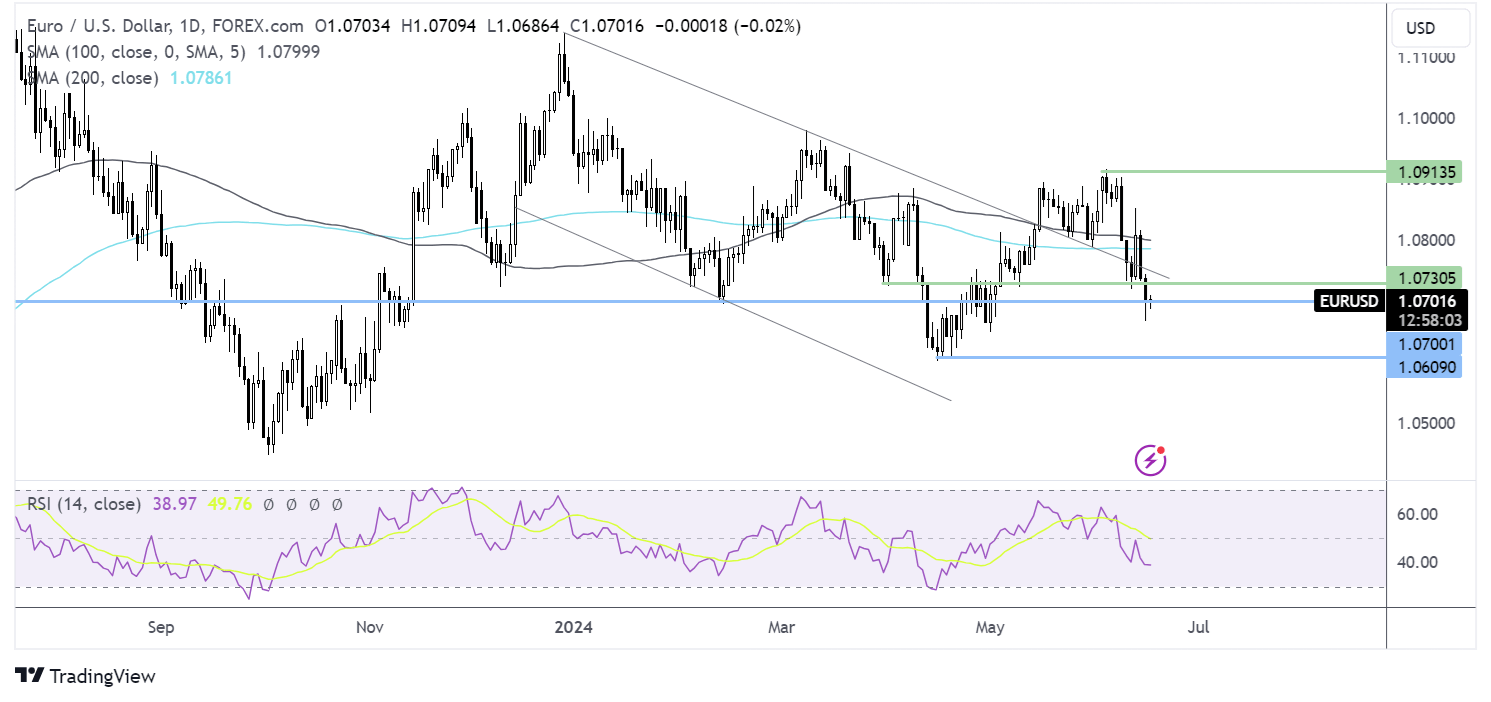
EUR/USD steadies with political uncertainty still at the forefront
- Worries regarding France’s fiscal outlook hit the EUR
- Far-right & left parties point to heavy spending
- EUR/USD tests 1.07 support
EUR/USD is holding steady at the start of the new week after experiencing its worst weekly performance in two months in the previous week. Political uncertainties and fears of fiscal deterioration in France have pushed the euro lower ahead of the snap election.
Investors are concerned about a budget crisis in the euro zone's second-largest economy as the far right and left parties plan for heavy spending are gaining momentum in the polls.
There is no high-impacting eurozone data due today. Instead, the markets will continue to watch developments in France as political parties prepare for the election.
While the political turmoil has been a euro-bearish story, the euro accounts for around 57% of the US dollar index weighting, so the EUR weakness is also indirectly affecting the dollar, which gained 0.6% last week.
The US dollar is holding steady against its major peers after rising in the previous week. The US dollar rose on EUR weakness after the Federal Reserve warned that interest rates could stay high for longer, projecting just one interest rate cut this year.
Neel Kashkari, Minneapolis Fed President said that he believed one rate cut this year was a likely outcome with a rate cut in December.
Attention will now turn to New York Empire manufacturing data and comments from Fed speaker Harker.
This week, the US economic calendar is quieter with just retail sales, but plenty of Fed speakers for further clues on the outlook for Fed rate cuts.
EUR/USD forecast – technical analysis
After reaching a high of 1.0915 at the start of the month, EUR/USD has been trending lower, breaking below the 100 and 200 SMA, which, combined with the RSI below 50, keeps sellers hopeful of further losses.
Sellers will look to take out 1.07 and last week’s low of 1.0665 to extend the selloff towards 1.06.
Meanwhile, buyers will need to rise above 1.0725, the March low, to extend gains toward the 200 SMA at 1.0790.

Oil falls after weak US consumer sentiment & China data
- US Michigan sentiment fell to a 7-month low
- China's industrial output and house prices fall
- Oil consolidates between 200 SMA and 77.00 static support
Oil prices are falling at the start of the week amid concerns of softer U.S. consumer demand and weak China data
According to the latest Michigan consumer sentiment index, consumer sentiment dropped to a seven-month low in June amid worries over households' personal finances and persistent inflation.
Meanwhile, worries that the Federal Reserve could keep interest rates high for longer also weigh on oil prices. Last week, The Fed lowered its rate cut projections to just one this year, down from 3, while over the weekend, Minneapolis Fed President Neel Kashkari said that this was a reasonable prediction.
Chinese industrial production missed expectations, and a slowdown in the property sector, which showed no signs of improvement, highlighted the struggles that China, the world’s largest oil importer faces in its recovery.
Chinese domestic crude oil production rose 0.6% to 18.15 million tonnes, while today's output was 81.1 million tonnes, up 1.8%.
Oil prices gained 4% last week after encouraging demand outlooks in the OPEC+ and IEA monthly reports.
Oil forecast – technical analysis
Oil’s recovery from the 72.50 May low ran into resistance at 79.50, the 100 SMA, and has since released lower. The price is consolidating below the 100 and 200 SMA and support at 77.00 on the downside.
Buyers will need to rise above a cluster of resistance around the 79.50 – 80.50 zone in order to break out towards 84.50, the late April high.
Meanwhile, sellers will need to take out 77.00 and 75.00 last week’s low to open the door to 72.50.






